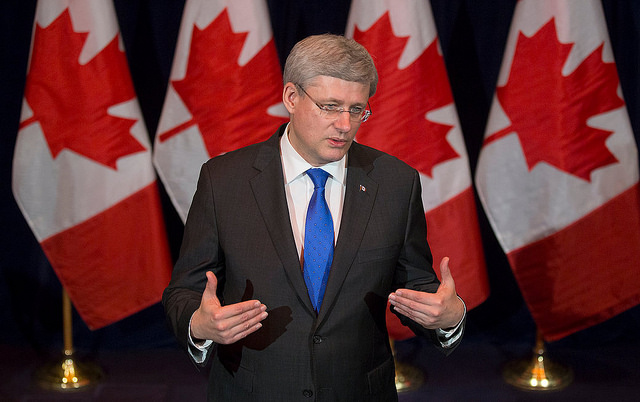The Harper government is now in its tenth year ruling Canada. Under Stephen Harper every aspect of politics has been adjusted to serve the Conservative Party and the key sections of capital that it answers to — oil and gas, mining, agribusiness and finance.
On the international stage Canada’s role has been shaped by those interests, overriding protection of the environment or human rights. Domestically the Harper regime has taken a ruthless approach to any opposition in civil society or in Parliament — slashing funding, smearing reputations, imposing gag orders, and habitually abusing legislative time.
This government has overseen the largest privatization of municipal services in Canada’s history through requirements that all major infrastructure projects be carried out as “public-private partnerships.” They have refused to renew the Canada Health Accord and are cutting $36 billion from health-care funding across Canada.
Although the Conservatives have been retreating on some aspects of the Temporary Foreign Worker Program, they ushered in a massive expansion of the program that both exploit migrant workers and undermine local wage standards.
Harper is the most anti-worker Prime Minister in living memory. His contempt for organized labour goes back to his roots in the National Citizens Coalition and continues with Bills 377 and 525.
Few people realize how Bill 525 impedes workers unionizing in key sectors — pipelines, transportation including airlines, media, communications and finance, as well as federal employees. He has abolished card-check certification and the federal Fair Wage policy, while his ministers have zealously intervened in collective bargaining. Cuts to Employment Insurance result in less than a third of jobless workers in the GTA getting benefits, and construction union members risk being cut off if they won’t work for non-union contractors at substandard wages.
The Conservatives have intensified their attack on the rights of First Nations with the aim of opening up aboriginal land to oil, gas and mining interests regardless of the environmental or social impacts. The blatant disregard for treaty rights sparked the Idle No More movement which created a new level of awareness about native issues across the country. Other abuses of power such as the (un)Fair Elections Act, along with the whiff of corruption surrounding Mike Duffy, Dean del Mastro and the robocalls scandal have clearly offended the majority of Canadians.
But Harper does not need a majority of voters to win the next election. His strategy is to mobilize his base while marginalizing his opponents. Recent polls suggest the Conservatives are within striking distance of re-election, especially with the new seat distribution in effect this spring. For those who want to reclaim Canada in the interests of working families, the task is clear.
In the coming months, Canadians must engage in a serious dialogue about the future of this country. The shameful record of the Harper regime needs to be patiently exposed, and the class interests of who it serves brought to light. The Conservatives are spending millions of tax dollars in blatantly partisan advertising, so it will take a lot of work to keep their true record on focus. The opposition parties will play their role as both critics and potential governments, but there are many things the rest of us could do:
-
Build on the campaign for retirement security initiated by the Canadian Labour Congress and supported by most provincial premiers. It calls for expanding the Canada Pension Plan to balance the fact that most people don’t have secure workplace pension plans and will run out of savings after retirement. The Tories instead raised the CPP eligibility age to 67. Seniors vote, and could change the outcome of a close election.
-
Take on the fight to defend door-to-door mail delivery. There are many vulnerable Conservative tidings in the GTA where homeowners are outraged that they will lose this vital service.
-
Challenge the Conservatives’ narrative of economic stewardship. The fact is that 80 per cent of new jobs are part-time, and income inequality is growing faster than in any other OECD nation.
-
Focus on getting young people engaged in politics. With youth unemployment in the double digits, this will be the first generation to be worse off than their parents. Many cannot find stable jobs, yet too few turn out to vote to change their future.
-
Engage activists and leaders from diverse communities to challenge the new-found influence of Conservative Party within their communities.
-
Raise our collective expectations about accountability and democracy.
Nobody knows whether the “law and order” Conservatives will again break their own law and call an election before the set date in October. But chances are good that they will, so we need an urgent discussion on how the majority of Canadians can take back our country in 2015.
John Cartwright is president of the Toronto and York Region Labour Council.
This piece originally appeared on the Toronto Star and is reprinted with permission from the author.
Photo: flickr/Stephen Harper




